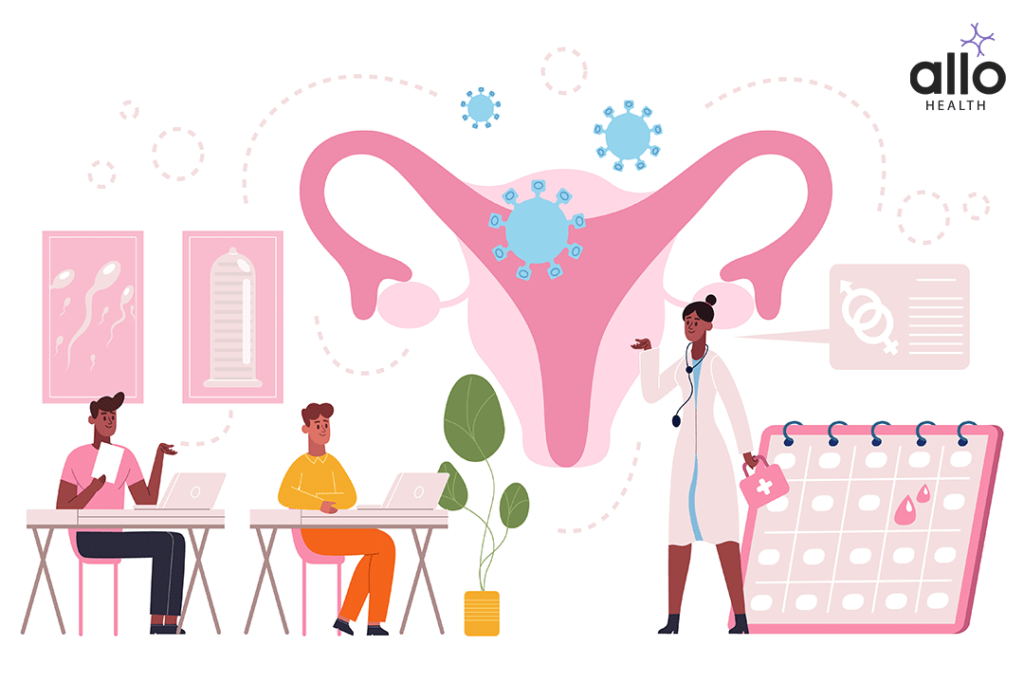The Difference Between Fertility and Sexual Wellness

Allo Health is dedicated to personalized well-being, offering support and trusted information tailored to individual health goals. The platform emphasizes human-generated content, led by a distinguished medical team of experts, including physicians and sexual health specialists. Their commitment to credibility involves rigorous fact-checking, authoritative research, and continuous updates to ensure accurate, up-to-date information. Allo Health's unique approach goes beyond conventional platforms, providing expert-led insights and a continuous commitment to excellence, with user feedback playing a crucial role in shaping the platform's authoritative voice.

A Psychotherapist with Clinical specialization, working for over seven years now. Areas of specialization range from Anxiety-related disorders, Mood-related disorders, Personality disorders, Sexual dysfunctions & other mental health issues.
Why This Was Upated?
Our experts continually monitor the health and wellness space, and we update our articles when new information became available.
Updated on 16 April, 2024
- Article was updated as part of our commitment to diversity, equity, and inclusion.

"The following blog article provides general information and insights on various topics. However, it is important to note that the information presented is not intended as professional advice in any specific field or area. The content of this blog is for general educational and informational purposes only.
Book consultation
The content should not be interpreted as endorsement, recommendation, or guarantee of any product, service, or information mentioned. Readers are solely responsible for the decisions and actions they take based on the information provided in this blog. It is essential to exercise individual judgment, critical thinking, and personal responsibility when applying or implementing any information or suggestions discussed in the blog."
We all know that sex plays a crucial role in our lives. It is something that directly affects psychological and physical wellness. But how many times were you left perplexed and baffled when you got questions regarding sexual wellness and reproductive health services but couldn?t find the correct answer?
Fertility and Reproductive Health
Because of a lack of sex education, many of us view fertility and sexual wellness as the same. But should both of those be put into one category? Or are fertility and sexual wellness two separate entities?
Is There A Difference?
Fertility and sexual wellness are often thought of as separate concerns, but they are closely related and can have a significant impact on each other. Fertility refers to the ability to conceive and have a baby, while sexual wellness encompasses a wide range of physical, emotional, and psychological factors that affect sexual health and satisfaction. Understanding the difference between these two concepts is important for anyone who wants to improve their overall reproductive and sexual health. In this article, we will explore the key differences between fertility and sexual wellness and discuss how they affect each other.
The most notable aspect of the difference between fertility and sexual wellness is the fact that couples who have had excellent sexual health over the years might encounter concerns related to infertility without noticing the signs.
Sexual Wellness: What Does it Mean?
Sexual wellness is a holistic concept that concerns the physical state, psychological state and social well-being of sexual activities.
The idea of sexual wellness concerns the act of engaging in sexual intimacy and being able to perform it with openness and an emotional connection. By prioritizing sexual wellness, individuals can improve their overall sexual experiences and relationships.
This umbrella term comprises psychological as well as physical connections between both partners with mutual consent.
Some of the aspects of sexual wellness consist of:
- Access to reproductive health services: Contraceptive services, postnatal care, pregnancy-related care
- Awareness about sexually transmitted infections and diseases
- Having access to sex education from a legitimate source
- Practising consensual sex and seeking help if ever required.
- Ability to achieve sexual pleasure and satisfaction whenever desired
- Breaking the taboo about sexual health and openly discussing the concerns with the sexual partner or the doctors.
So, What is Fertility?
The term fertility refers to the ability to conceive after attaining sexual maturity. Infertility is typically diagnosed when a couple cannot conceive despite having at least a year of unprotected sex. At this point, their doctor will start investigating the potential causes.
Infertility: What Are the Potential Causes?
Infertility is not related to just females but both partners. There are numerous potential causes of infertility.
Sexual Dysfunctions And Abnormalities
Ovarian dysfunction, fallopian tube obstructions, or uterine abnormalities such as fibroids are frequently the root causes in females. Men can have hormonal or genetic disorders, and disruptions in the ejaculatory and or testicular function that could possibly be contributing to their infertility.
Age
Age is a significant factor in fertility and the ability to conceive. As women age, their fertility decreases and the risk of infertility increases. Women’s fertility typically peaks between age 20 and 30, with a possible significant decrease after age 35. For men, fertility also decreases with age, but at a much slower rate than for women.
Substance Use And Abuse
Age, smoking, alcohol and drug use, some medications, cancer treatments, and other medical disorders are among the variables that can affect fertility in both men and women.
Are There Any Associations Between Fertility And Psychological Well-Being?
Fertility and psychological well-being are closely linked, with the stress and emotional toll of infertility affecting not only those struggling to conceive but also their partners. Infertility can cause feelings of sadness, depression, and anxiety, and it can also affect self-esteem and sexual satisfaction.
The emotional impact of infertility can be intensified by the physical and financial stress of fertility treatments and the pressure to start a family. On the other hand, maintaining good mental and emotional health can also benefit fertility. Stress can affect hormone levels and disrupt the menstrual cycle, making it more difficult to conceive.
Reproductive Health Services And Its Connection To Sexual Well-Being?

Reproductive health services are essential for maintaining sexual well-being and overall reproductive health. These services include access to contraception, prenatal care, and fertility treatments, as well as education and information about sexual health and reproduction.
Access to these services is important for individuals and couples who want to plan their families and make informed decisions about their reproductive health.
Contraceptive Services
Contraception, for example, allows individuals to control their fertility and prevent unintended pregnancies, which can have a positive impact on their overall sexual and reproductive health.
Due to reasons like a lack of healthcare facilities or providers who offer contraception, many adolescent women may not be receiving adequate contraceptive care. Additionally, social or cultural barriers may prevent adolescent women from seeking or accessing contraceptive services.
Pregnancy-Related Care
Pregnancy-related and newborn care services are essential for the health and well-being of expecting mothers and their babies. These services include prenatal care, ultrasound, childbirth education classes, and postpartum care.
Postnatal Care
Postnatal care services are essential for the health and well-being of new mothers and their babies. These services include care for the mother during the weeks following childbirth, as well as check-ups and screenings for the baby. Some examples of postnatal care are providing assistance and support to breastfeeding mothers, postnatal care for premature babies etc.
Why Is There A Lack Of Such Facilities?
Due to reasons like a lack of healthcare facilities or providers who offer contraception, many adolescent women may not be receiving adequate contraceptive care. Additionally, social or cultural barriers may prevent adolescent women from seeking or accessing contraceptive services. Access to pregnancy-related and post-natal care services is also limited because of this. Eventually, this goes on to affect one’s sexual and psychological well-being.
Sexual health is as important as physical and mental health. In most cases, one consultation can go a long way. Personalised, discreet, and judgement-free treatment at your fingertips – book an online consultation with one of Allo?s leading experts.







































